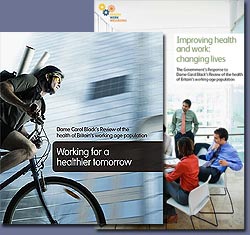 |
|
Health & Well-Being Is Not 'Fluffy': It's Proper Trade Union Business
More than two-thirds of employers admit to not taking any measures to help keep staff with health problems in work and only four out of ten are aware of any Government health and well-being initiatives.
These statistics, according to Dame Carol Black, the National Director for Health and Work, show the lack of understanding and connection between people's health and their life at work. Speaking at a conference held by unionlearn Southern & Eastern TUC in London, she said that unions can play a role in improving the health and well-being of their members.
 She said: 'Work is generally good for physical and mental health and well-being. Most people feel better if they are in work and engaged in work. But that work needs to be 'good work'. It needs to be well managed so it leads to a healthy, engaged workforce that is resilient. She said: 'Work is generally good for physical and mental health and well-being. Most people feel better if they are in work and engaged in work. But that work needs to be 'good work'. It needs to be well managed so it leads to a healthy, engaged workforce that is resilient.
This not only enhances productivity, it also contributes to a well-functioning society and a better economic performance. There is a business case: money spent on improving the work environment will soon be recouped if it prevents sick leave and staff turn-over. Too often health and work are not acknowledged as related and inter-dependent. The workplace potential for prevention and promotion goes largely unrecognised.'
She said that the workplace was a good place to promote the benefits of health, such as quitting smoking and better exercise and diet. She acknowledged that work practises can have a direct effect on the health and stress levels of staff. 'A workplace that is fair, flexible and gives its staff autonomy can have a positive effect on the mental health of the workforce. A lot of people are feeling under stress at the moment because they fear that their job is at risk. Good management practice, for example being open with the staff and offering them support, can make a difference,' she said.
 The conference heard that in a survey of senior managers (in 2008), half of them thought that none of their workers would ever suffer from a mental health problem during their working life, whereas one in six people in the UK will be experiencing depression and problems related to stress. The conference heard that in a survey of senior managers (in 2008), half of them thought that none of their workers would ever suffer from a mental health problem during their working life, whereas one in six people in the UK will be experiencing depression and problems related to stress.
Union reps, at the conference, said that they had been using Adult Learning Day as a springboard to raise health awareness issues with their members, but there was a need to make this work sustainable. Delegates were urged to ensure that there is trade union representation on the new health and well-being boards, proposed in the Health and Social Care Bill, now in Parliament.
Tom Wilson, director of unionlearn, said: 'Trade unions have for a long time been involved in health and safety issues in the workplace. It is right that we should also be looking at problems such as stress, general health and well-being.
There may be scepticism that it is part of a 'fluffy' agenda from a Conservative Prime Minister. But this is something that trade unions have been doing for a long time. We should be negotiating against unsociable shift patterns that prevent people from having a proper family life, or unfair performance management systems that put stress on staff. We should be promoting anti-smoking initiatives and reps should be checking that the canteen is putting on healthy food for the staff and we should be persuading employers to introduce preventive health measures, for example screening for breast and testicular cancer.'
Barry Francis, regional manager SERTUC, said: 'There is still a stigma attached to mental health and it's clearly a trade union issue that this prejudice should be challenged. Union learning reps have a role to play in providing employers, colleagues and the community with the relevant information so that support can be provided.'
Sharon Allen, a RMT learning organiser, said that health awareness events held during Adult Learning Week by the union had been very successful. She said: 'Men are very bad at going to the doctors, but they are more likely to get involved in screening or preventative programmes if their mates at work are taking part. The union has done work in providing information about prostate and testicular cancer and the workplace is a good place to get these messages across. Stress is another issue. We have found that a lot of stress is caused by middle management. But by providing the right training, problems can be resolved.'
Source: TUC
|
|
|
Designed, Hosted and Maintained by Union Safety Services
|